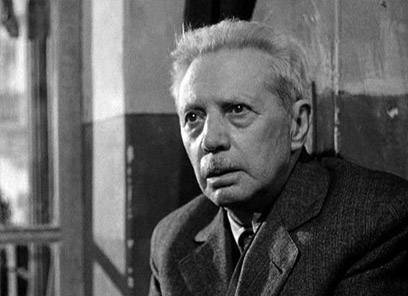Umberto D.
1952's UMBERTO D was a powerfully emotional experience for me. Far moreso than I was expecting. It deals with two issues that strike close to home: fear of growing older and fear of losing a pet. These are a few of the surface themes, and even if you refuse to plumb director Vittorio De Sica's film any deeper, with those there is plenty to engage and provoke. Also fairly obvious are the examinations of social class and individual relevance in the face of advancing years. You've given your best decades serving the government, only to be thrown a pittance of a pension when you retire. But there is still rent to pay. And even though you've faithfully met it on time every month for twenty years, the landlord will think nothing of turning you out if you don't have the full amount by a certain date.
De Sica doesn't show much humanity in the post WWII Rome setting of his movie. You might paint the landlady, Ms. Belloni (Lina Gennari) as a villain. She callously threatens Umberto Domenico Ferrari (Carlo Battisti) with eviction from her rooming house, and even rents out his room by the hour to illicit lovers to supplement income. And has workers begin tearing out the walls as she wants to convert the area to a large living room. Umberto is short about ten thousand lire and his subtle but unmistakable pleas to friends are embarrassingly and politely rebuffed. But like many Italians, Umberto is proud, too much so to beg on street corners. His shredded dignity is vivid as he sits in his dingy bedroom, already crawling with an ant infestation, looking at torn wallpaper and a hole in the plaster. It's an unbearably sad image.
But there are lights. Umberto has a faithful dog named Flike as a companion. Their relationship is the heart of the film, and whatever other veiled intentions De Sica and screenwriter Cesare Zavattini had with this thread, it nothing if not prizes the unconditional love animals have for their masters. Check the final ten or fifteen minutes of the film. I was tearing up and holding my breath. These almost Chaplinesque scenes show the bond only animal lovers can relate to. One that, unlike those with human contacts, knows no discrimination of social class. Some of non-actor Battisti's (a university lecturer) best moments are his reactions to the cold, disapproving stares of the upwardly mobile.
There is also the house maid, a teenage girl named Maria (Maria-Pia Casillo) who likes and takes pity on Umberto. She confides her secret of pregnancy to the old man, worried that she will be fired when it is discovered. The father may be one of two soldiers, both of whom have abandoned her. Maria will visit Umberto while in he is in the hospital (a stay he contrived so he can at least have clean sheets for a few days) and offer encouragement not found elsewhere. I liked Maria's performance, though I caught her looking at the camera and/or De Sica a few times in her inexperience. I read that she didn't want to be in the movie, but changed her mind when the producers paid her the hefty sum for which she asked. Sometimes it's good not to know behind the scenes trivia like this.
UMBERTO D. is small masterpiece. A perfectly understated human drama that happens to use the love for and of a dog to illuminate hope for mankind.



Comments